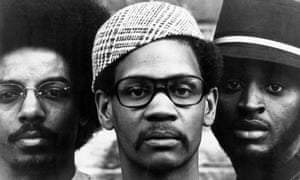Disir
Platinum Member
- Sep 30, 2011
- 28,003
- 9,607
- 910
It is half a century since the Last Poets stood in Harlem, uttered their first words in public, and created the blueprint for hip-hop. At an intimate open house session, they explain why their revolutionary words are still needed
Rebecca Bengal

Jalal Mansur Nuriddin, Abiodun Oyewole and Umar Bin Hassan. Photograph: Michael Ochs Archives
You can trace the birth of hip-hop to the summer of 1973 when Kool Herc DJ’d the first extended breakbeat, much to the thrill of the dancers at a South Bronx block party. You can trace its conception, however, to five years earlier – 19 May 1968, 50 years ago this weekend – when the founding members of the Last Poets stood together in Mount Morris park – now Marcus Garvey park – in Harlem and uttered their first poems in public. They commemorated what would have been the 43rd birthday of Malcolm X, who had been slain three years earlier. Not two months had passed since the assassination of Martin Luther King. “Growing up, I was scheduled to be a nice little coloured guy. I was liked by everybody,” says the Last Poets’ Abiodun Oyewole. He was 18 and in college when he heard the news. “But when they killed Dr King, all bets were off.”
That day led to the Last Poets’ revelatory, self-titled 1970 debut of vitriolic black power poems spoken over the beat of a congo drum. Half a century later, the slaughter continues daily, in the form of assaults, school shootings and excessive police force. “America is a terrorist, killing the natives of the land / America is a terrorist, with a slave system in place,” Oyewole declares on the Last Poets’ new album, Understanding What Black Is, in which he and Umar Bin Hassan trade poems over reggae orchestration, horns, drums and flute. It’s their first album in 20 years, reminding a new generation of hip-hop’s roots in protest poetry.
“Ghostface Killah and RZA [from the Wu-Tang Clan] will bow down when they see us,” Oyewole says. “People say we started rap and hip-hop, but what we really got going is poetry. We put poetry on blast.” The Last Poets’ poems have been sampled or quoted by NWA, A Tribe Called Quest, Public Enemyand many more; the rapper Common’s Grammy-nominated 2005 song The Corner features the Last Poets (as well as Kanye West) representing the old-school guys in the neighbourhood who explain how black power rose up from the streets. “The corner was our Rock of Gibraltar,” Bin Hassan says in the song. “Power to the people!”
The Last Poets: the hip-hop forefathers who gave black America its voice
That's pretty cool.
Rebecca Bengal

Jalal Mansur Nuriddin, Abiodun Oyewole and Umar Bin Hassan. Photograph: Michael Ochs Archives
You can trace the birth of hip-hop to the summer of 1973 when Kool Herc DJ’d the first extended breakbeat, much to the thrill of the dancers at a South Bronx block party. You can trace its conception, however, to five years earlier – 19 May 1968, 50 years ago this weekend – when the founding members of the Last Poets stood together in Mount Morris park – now Marcus Garvey park – in Harlem and uttered their first poems in public. They commemorated what would have been the 43rd birthday of Malcolm X, who had been slain three years earlier. Not two months had passed since the assassination of Martin Luther King. “Growing up, I was scheduled to be a nice little coloured guy. I was liked by everybody,” says the Last Poets’ Abiodun Oyewole. He was 18 and in college when he heard the news. “But when they killed Dr King, all bets were off.”
That day led to the Last Poets’ revelatory, self-titled 1970 debut of vitriolic black power poems spoken over the beat of a congo drum. Half a century later, the slaughter continues daily, in the form of assaults, school shootings and excessive police force. “America is a terrorist, killing the natives of the land / America is a terrorist, with a slave system in place,” Oyewole declares on the Last Poets’ new album, Understanding What Black Is, in which he and Umar Bin Hassan trade poems over reggae orchestration, horns, drums and flute. It’s their first album in 20 years, reminding a new generation of hip-hop’s roots in protest poetry.
“Ghostface Killah and RZA [from the Wu-Tang Clan] will bow down when they see us,” Oyewole says. “People say we started rap and hip-hop, but what we really got going is poetry. We put poetry on blast.” The Last Poets’ poems have been sampled or quoted by NWA, A Tribe Called Quest, Public Enemyand many more; the rapper Common’s Grammy-nominated 2005 song The Corner features the Last Poets (as well as Kanye West) representing the old-school guys in the neighbourhood who explain how black power rose up from the streets. “The corner was our Rock of Gibraltar,” Bin Hassan says in the song. “Power to the people!”
The Last Poets: the hip-hop forefathers who gave black America its voice
That's pretty cool.
